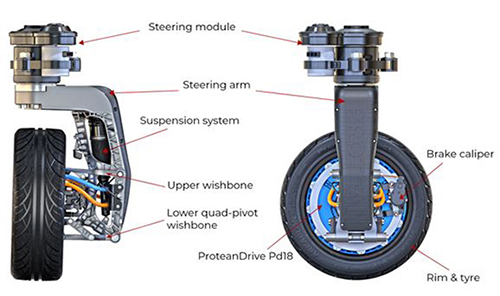Protean, the British builder of in-wheel electric motors has a new idea for electric buses.
Not only should they use Protean's in-wheel electric motors, they could use them on the company's newly developed suspension arms that could allow each wheel to rotate 360 degrees on its own axis. Once all four wheels can spin around on their own, like a coffee table or portable kitchen island, so could the vehicle.
Protean says it thinks this could transform urban transportation vehicles such as city buses or shuttle buses by allowing them to move in every direction seamlessly, to be able to dock at curbs on either side, the front or rear. As self-driving vehicles are developed—commercial ones, especially—such a fully-castered, motorized pod could enable smoother traffic flow by allowing the vehicle to slide out of the way of other traffic, slip directly between obstacles, or more effectively dodge potholes, the company suggests.

Protean Electric 360-degree steering and suspension
In older cities with smaller streets and more acute corners, the system will allow bigger buses to negotiate corners without stopping, which could also reduce congestion.
The company says its new Protean 360+ suspension system can also allow buses to "kneel" to provide access for wheelchairs and to allow passengers to step directly out into the curb.
The system uses a large support arm that attaches the whole suspension, including the motor, to a single pivot point above each wheel. A new, patented, "quad-pivot" double-wishbone suspension design attaches the wheel to the rotating arm.

Protean 360+ suspension on urban bus concept
Protean says independent tests have determined that the instant torque of in-wheel motors can improve the operation of electronic stability control, anti-lock brakes, and traction control, and reduce stopping distances in an emergency by 7 percent.
Each in-wheel motor in the 360+ suspension system delivers 107 horsepower and 922 pound-feet of torque, which could alleviate the need for a transmission, at least in a relatively low-speed vehicle like a city bus.
In June, Protean was bought by Chinese EV maker National Electric Vehicles Sweden, which owns the remains of the former Saab brand and builds electric continuations of the last Saab 9-3s for Chinese market. There, they are popular as taxis. NEVS, in turn, is partly owned by Hong Kong conglomerate Evergrande, which also has financial ties to Faraday Future and supercar maker Koenigsegg.












